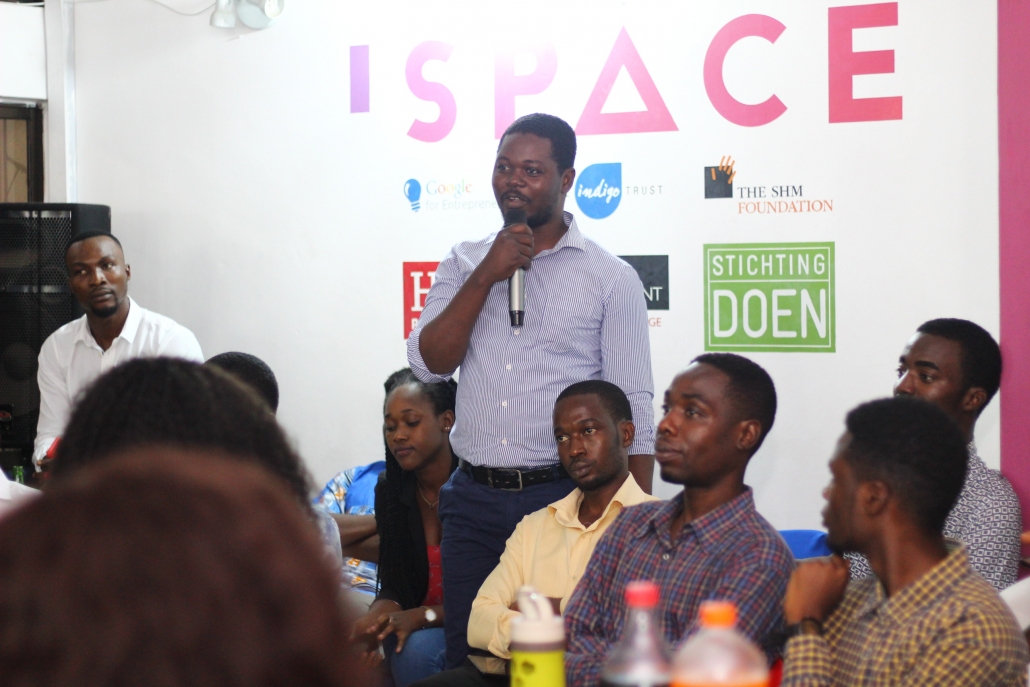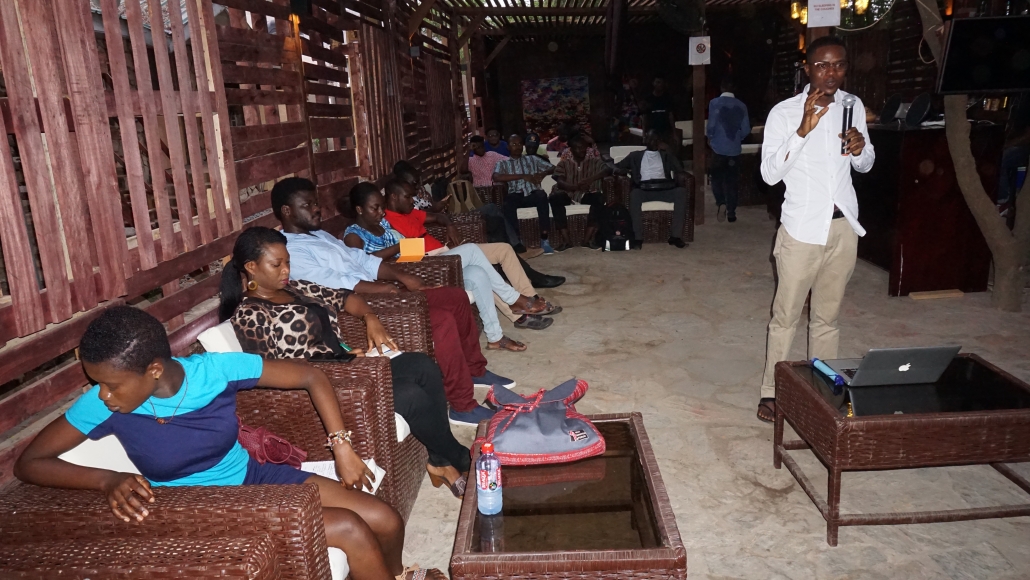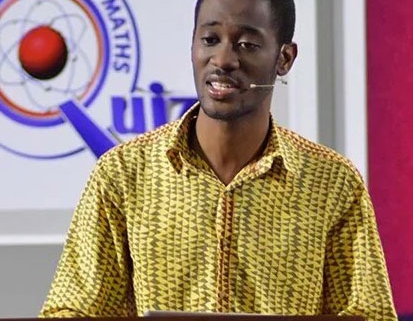Global Lab – building Ghana’s open science and innovation community.
Ghana is definitely one of the most interesting countries on the African continent when it comes to science and tech initiatives. One important player is the networking organization Global Lab which brings together people to address challenges and opportunities of the future.
This is the third article in the Crastina theme ”SciComm in Africa”. Earlier articles can be found here and here.
According to Global Lab’s web page, the organization is “bringing together students, scientists, researchers, innovators, change makers and educators together to work together to solve problems using science and technology”. We got in touch with the head of the organization, Gameli Adzaho, to hear some more.
 Hi Gameli! Please tell us a little about Global Lab!
Hi Gameli! Please tell us a little about Global Lab!
We started Global Lab Ghana Community as a Facebook group in October 2012 after a conversation at BarCamp Tema on how to make science education more engaging and worthwhile. Later, some of us, including students from Keta Senior High Technical School, where I was teaching science at the time, decided to create a platform to connect students, teachers, and other science enthusiasts online. Our goal then was to exchange useful learning resources online, connect students to peers and mentors, and provide support to students seeking to work on their own projects.
Over time more people joined our effort, and as students and mentors evolved, we morphed into a community of young STEM professionals and students, who are mobilized for social impact activities. In 2017 we registered a non-profit, Global Lab Network, to drive the affairs of the community and create the possibility of carrying out more offline activities. Some of our thematic areas are STEM education and digital literacy, urban sustainability and environmental health, and rural innovation. Global Lab believes that scientific thinking should not be limited to conventional labs or to certain professions, and advocates for increased scientific literacy in the general population.
In other words, everyone must be a scientist! We fully embrace open source philosophies and tools, as they enable our core values of learning, friendship, and service.

Gameli Adzaho has a B.Sc. in Biochemistry from University of Ghana and a M.Sc. in Environment and Human Health from Exeter University, UK.
What projects do you currently run?
Aside from curating the Global Lab Ghana Community Facebook group itself, we are currently engaged in two main initiatives.
- The first one is Global Lab Community Action, which involves partnerships with youth-oriented organizations like Nneka Youth Foundation to reach young people, mainly in rural areas, with information on STEM topics. We designed a session on ‘creativity and problem-solving‘, which we deliver at the annual World Changers Camp of Nneka Foundation at Ve Agbome in the Afadzato South District of the Volta Region of Ghana. Nneka Camp attracts pupils from across the Volta Region in batches over one month; each batch attends the programme for one week. So far we have engaged with over 3500 learners on topics such as design thinking, environmental stewardship, and Water, Sanitation, and Hygiene (WASH).The brilliant thing about Community Action is that it gives our members, many of whom are either university students or young professionals, the opportunity to be involved at the grassroots, which leads to great networking and development of critical skills such as leadership, communication, and organization. We are in talks with a potential partner to extend our #GLCommunityAction to the Central Region this year.
- The second one is Science Cafe (#SciCafeGH), which is more tailored to urban audiences. It is a knowledge exchange and networking platform which enables scientists and innovators to share their work with lay audiences in an informal setting. The interesting thing about this programme is that it can be organized in places such as cafes, restaurants, or bars. We started in August 2018 and we have organized two events so far.At Science Cafe, we challenge our speakers to be interactive and present their work using simple and easy-to-understand language that participants can easily connect with. Attendees include high school students, researchers, teachers, university students, start-up entrepreneurs, and general science enthusiasts. We have discussed artificial intelligence and its relevance to Africa as well as the importance of co-design in creating sustainable innovations in the WASH sector so far. We are encouraged by the enthusiasm of Science Cafe participants, and we intend to run the series on a quarterly basis in 2019.
In addition, we partner with organizations like Idea2Market Foundation, Africa Open Science and Hardware, and the Next Einstein Forum to organize activities that promote STEM and innovation in the Ghanaian ecosystem. Specific examples include Innovation Clinic, Africa Open Science and Hardware Summit, and Africa Science Week Ghana.
How do you recruit new members?
New members join Global Lab through our Facebook group. Our current members sometimes invite their contacts who may be interested. We see people joining after attending any of our programmes or listening to talks presented at other events such as barcamps. Once you answer our pre-approval questions, you’re welcome to be on board!
What’s your strategy to reach a broad public with your #Sci4D events?
(First of all: I’m glad you caught the hashtag! :D.) Then to answer your question: partnership is key! We appreciate the fact that we’re not in the STEM and innovation ecosystem alone, and there are other players, bigger or smaller. Some of our partners target specific audiences which we would not ordinarily focus on, so joint activities introduce us to new people. Also, because of our specific interest in science, technology, and innovation, we enrich other platforms with our deep insights into these areas.
We use social media a lot, and this also helps us to spread our gospel online. Thank you to all who share and retweet our stuff. It would be great to integrate more traditional media especially radio and print in our work. Let me say here that, we’re looking to collaborate with more stakeholders like universities, the media, local authorities, the private sector, foundations, and development organizations to take our work to the next level.
 What is Innovation Clinic and how does Global Lab engage?
What is Innovation Clinic and how does Global Lab engage?
Innovation Clinic is an initiative of Idea2Market Foundation, and we are glad to have been involved in conceptualizing and implementing it from the get-go. It is a one-of-its-kind free and exclusive informal gathering promoting a mindset revolution and a systems thinking approach to problem-solving. It hosts diverse stakeholders including technologists, researchers, entrepreneurs, and creatives, working in different sectors of the economy, for a conversation over food and drinks.
Bringing in these diverse stakeholders leads to a breakdown of silos thus promoting a culture of innovation and entrepreneurship. The clinical approach helps to diagnose the barriers young innovators and entrepreneurs face on their path to scaling their innovations. They walk away with some ideas and action points with regards to how to deal with their challenges. Aside programme design, Global Lab has been instrumental in convening participants for the first clinic hosted by iSpace Foundation and forging partnerships with Kumasi Hive for the second edition.
In general, what are your main opportunities and your main challenges?
As a community of young people interested in science, technology, and innovation for development, we see opportunities in global efforts like the Sustainable Development Goals (SDGs) and the drive towards open science. We therefore plan to go beyond our online and offline engagements towards rolling out community/citizen science and social innovation projects aimed at developing solutions to some of the challenges of Ghana and beyond.
For example, we’re looking at how to make hands-on STEM education accessible to children in Afadzato South District and eventually to more children in rural areas of Ghana. Last October, through the My Region is the Lab initiative of Innovation Factory, a GIZ programme, I had the opportunity to further develop this concept during our design thinking workshop and presented the final plan to an audience for feedback at Start-up Safari Munich. Also, we have developed a plan for a community science approach to air quality monitoring, and we’re working with colleagues from the Open Air Quality Ghana community to roll it out.
I’m very proud of how Global Lab has grown and the successes chalked by our members. This includes awards for social impact and professionalism in the water sector, a full scholarship to a data science programme, and numerous local and international conference and workshop invitations. Although some are individual accomplishments, we celebrate these wins as a community, and this spurs everyone to work harder.
A crucial challenge we face is the lack of dedicated staff to steer the affairs of the organization and the community. Currently, I’m the only one working on Global Lab near full-time while other team members are supporting on a voluntary basis. Some community members support every now and then to run specific initiatives. Also, we face a real issue with finding adequate funding to run our programmes. We have relied on the benevolence of a few donors and sometimes have to fall on our own pockets to run activities. While this has worked well so far, we need some serious financial support to be able to effectively carry out our proposed STEM and air quality projects. This will not only benefit communities but also our members as these projects provide valuable capacity-building opportunities. We are mindful of the need to build sustainable financing models into our operations, so this is something to think about as we grow.
Finally, we could benefit from enhanced technical capacity and access to lab space and equipment. It would be brilliant if some universities, innovation hubs, or fablabs could support our work by co-creating workshops for our project teams and/or helping us to access suitable workspace for our community.

Please give three pieces of advice to a group who wants to start an organization like yours!
My advice will be along the values of GLab – Learning, Friendship, and Service.
- Firstly, as a team, inculcate learning and improvement in everything you do. This will allow you to identify real needs, find partners, and come up with creative ideas to achieve your purpose.
- Secondly, networking and collaboration are important in achieving success in any complex endeavor. So take time to find people and organizations whose support will enhance your work. Similarly, do not shy away from supporting others when you can.
- Finally, be bold to test your ideas and explore new territories.
- Claire Price of Crastina receives outreach award from Royal Society of Biology - October 25, 2020
- Agile Science student project at Brussels Engineering School ECAM: “We can’t wait to try it again!” - August 28, 2020
- Create an infographic in the Lifeology SciArt Infographic Challenge - June 16, 2020
- Adam Ruben – The scientist that teaches undergraduate students comedy - March 27, 2020
- Sam Gregson, Bad Boy of Science: “Comedy helps to bridge the gap” - March 10, 2020
- The Coolest Science Merchandise of 2019 - December 16, 2019
- Science Media Centre (UK) offers guide on dealing with online harassment in academia - November 26, 2019
- Agile project management taught to students and researchers at Karolinska Institutet - September 20, 2019
- Stefan Jansson: Improve your credibility! (Crastina Column, September 2019) - September 6, 2019
- The People’s Poet: Silke Kramprich, tech communicator - August 31, 2019





This interview tells the Global Lab story quite well. Olle, thanks so much for the opportunity!